#Regulatory training
Text
Expert FCA Compliance Services | Professional FCA Compliance Consultants
Navigating the intricate landscape of Financial Conduct Authority (FCA) regulations can be daunting. At MEMA Consultants, we provide expert FCA compliance services to help businesses stay compliant and avoid penalties. Our team of skilled consultants offers a range of services including regulatory training, financial crime prevention, and compliance advisory, all tailored to meet the specific needs of our clients.
When selecting an FCA compliance consultant, it's essential to consider their experience, capacity, and ability to provide practical solutions. Our consultants not only identify issues but also work closely with your firm's key individuals to add real value.
For ongoing compliance support, we offer bespoke services to ensure you meet FCA requirements efficiently. From documentation to monitoring activities, our comprehensive support helps you maintain compliance with ease.
For more information, visit our FCA compliance consultants page.
#FCA compliance#FCA compliance services#FCA compliance consultants#regulatory compliance#financial crime prevention#regulatory training#compliance advisory#FCA rules#compliance solutions#MEMA Consultants
0 notes
Text
ASSESSING REGISTRIES TO SUPPORT DRUG REGULATORY DECISION-MAKING
The Cures Act of the 21st Century, enacted on December 13, 2016, aimed to expedite the development of medical products and facilitate quicker and more efficient delivery of innovations and advancements to patients in need. One of its additions was section 505F to the Federal Food, Drug, and Cosmetic Act (FD&C Act).
In compliance with the stipulations in section 505F, the FDA established a framework for the Real-World Evidence (RWE) Program, which assesses the potential utilization of RWE to aid in the approval of a new indication for a drug previously sanctioned under section 505(c) of the FD&C Act.
Read more at : https://lnkd.in/g4bgzuEK

1 note
·
View note
Text
#At Refrigerant Center INC#we specialize in providing comprehensive refrigerant solutions tailored to meet the diverse needs of our clients. With a deep understanding#Ventilation#and Air Conditioning) industry and its evolving regulatory landscape#we are committed to offering environmentally responsible refrigerant products and services.#Our company prides itself on being a trusted partner for businesses operating in various sectors#including commercial#industrial#and residential. Whether you're a facility manager#HVAC contractor#or equipment manufacturer#we have the expertise and resources to fulfill your refrigerant requirements efficiently and affordably.#Key Services and Products:#Refrigerant Sales: We offer a wide range of refrigerant products#including traditional HFCs (Hydrofluorocarbons)#low-GWP (Global Warming Potential) alternatives like HFOs (Hydrofluoroolefins)#and natural refrigerants such as CO2 and ammonia. Our extensive inventory ensures that clients can find the right refrigerant for their spe#Refrigerant Reclamation: Recognizing the importance of sustainability#we provide refrigerant reclamation services aimed at recovering#purifying#and reprocessing used refrigerants. Through our state-of-the-art reclamation facilities#we help clients minimize environmental impact while maximizing cost savings.#Regulatory Compliance Assistance: Navigating the complex regulatory landscape surrounding refrigerants can be challenging. Our team stays u#national#and international regulations#including EPA (Environmental Protection Agency) regulations in the United States.#Technical Support: We understand that proper handling and usage of refrigerants are critical for the safety and efficiency of HVAC systems.#training#and educational resources to assist clients in handling refrigerants safely and effectively.#Customized Solutions: Every client has unique requirements
3 notes
·
View notes
Text
Fire Safety Training in Construction
In the realm of construction, fire safety training is not just a regulatory requirement; it’s a vital practice that safeguards lives and property. This article will delve into why fire safety training in construction is essential, its key components, and how it benefits both workers and construction projects.
Understanding Fire Safety Training in Construction
Understanding fire safety training…

View On WordPress
#construction training#emergency response#equipment maintenance#fire drills#fire prevention#fire safety#hazard identification#project management#property protection#regulatory compliance#Risk Management#Safety Culture#safety protocols#site safety#workforce training
2 notes
·
View notes
Text
Regulatory Affairs Course

Discover our comprehensive Drug Regulatory Affairs courses designed to equip you with the knowledge and skills needed for a successful career in pharmaceutical regulatory compliance. Gain expertise in drug approval processes, regulations, and submissions. Enroll now for a rewarding educational journey with our online courses. Get more Information at: https://www.companysconnects.com or contact us at 9691633901 for more info.
#pharmacovigilance courses#mes training#clinical research certified professional course#drug regulatory affairs certification
0 notes
Text
#HR compliance#HR challenges#HR solutions#Small business HR#HR outsourcing#Automating HR#HR software tools#Employee training#Regulatory compliance#Bambee HR#HR management#Time-saving HR solutions#HR compliance risks#Business compliance#HR record-keeping
0 notes
Text
Empowering Healthcare Professionals through Microlearning for Compliance and Ethics Training

The healthcare industry is one of the most heavily regulated sectors in the world, with professionals facing a complex web of overlapping federal and state regulations. These regulations cover a wide range of areas, including patient privacy, data security, billing practices, and clinical procedures. Navigating these regulations requires not only a deep understanding of the legal requirements but also the ability to apply this knowledge in real-world scenarios. In such a challenging environment, traditional training methods often fall short in providing healthcare professionals with the skills and knowledge they need to stay compliant and uphold ethical standards.
Microlearning, an educational approach that delivers content in small, focused bursts, offers a solution that is particularly well-suited to the needs of healthcare professionals. By breaking down complex compliance and ethics topics into bite-sized, easily digestible lessons, microlearning enables healthcare workers to learn and retain critical information more effectively. Furthermore, when microlearning is tailored to the specific job functions and risk-related responsibilities of individual employees, it becomes an even more powerful tool for ensuring that healthcare professionals are well-prepared to meet regulatory requirements and maintain the highest ethical standards.
The Importance of Compliance and Ethics in Healthcare
Compliance and ethics are foundational elements in the healthcare industry. Compliance refers to the adherence to laws, regulations, and guidelines that govern healthcare practices. Ethics, on the other hand, pertains to the moral principles that guide the behavior of healthcare professionals, ensuring that they act in the best interests of their patients and the public.
In healthcare, the stakes are high. Non-compliance with regulations can result in severe penalties, including fines, legal action, and damage to an organization’s reputation. Ethical breaches can lead to a loss of trust, compromised patient care, and even harm to patients. Therefore, it is essential that healthcare professionals are not only aware of the regulations and ethical standards that apply to their work but also know how to apply them in their day-to-day activities.
Challenges in Training Healthcare Professionals
Training healthcare professionals in compliance and ethics presents several challenges. First, the sheer volume of regulations can be overwhelming, especially for those who are new to the field or who have responsibilities that span multiple areas of compliance. For example, a healthcare professional may need to be familiar with regulations related to patient privacy (such as HIPAA), billing practices (such as Medicare and Medicaid rules), and clinical procedures (such as those set by the Joint Commission).
Second, the regulations themselves are constantly evolving. New laws and guidelines are regularly introduced, and existing ones are frequently updated. This means that healthcare professionals must engage in continuous learning to stay current with the latest requirements.
Third, traditional training methods, such as lengthy seminars or dense training manuals, are often ineffective in helping healthcare professionals retain the information they need. These methods can be time-consuming and difficult to fit into the busy schedules of healthcare workers, leading to low engagement and poor retention of the material.
How Microlearning Addresses These Challenges
Microlearning is designed to overcome the limitations of traditional training methods by delivering content in small, manageable chunks that can be easily absorbed and retained. This approach is particularly effective in the context of compliance and ethics training for healthcare professionals, as it allows for focused learning on specific topics without overwhelming the learner.
1. Tailored Learning for Job-Specific Needs
One of the key advantages of microlearning is its ability to provide tailored learning experiences that are relevant to the specific job functions and risk-related responsibilities of individual employees. In a healthcare setting, this means that microlearning lessons can be customized to address the unique compliance and ethics challenges faced by different roles within the organization.
For example, a nurse who handles patient records might receive microlearning lessons focused on data privacy regulations, such as the Health Insurance Portability and Accountability Act (HIPAA). These lessons could cover topics such as the proper use of encryption and masking techniques to protect patient information, as well as best practices for cataloging privacy metadata. By focusing on the specific compliance issues that are most relevant to their role, the nurse is more likely to retain the information and apply it in their daily work.
Similarly, a billing specialist might receive microlearning lessons on the regulations governing Medicare and Medicaid billing practices. These lessons could include scenarios that illustrate common billing errors and the potential consequences of non-compliance, helping the billing specialist to better understand the importance of accuracy and adherence to the rules.
2. Engaging and Interactive Content
Microlearning is also highly engaging, thanks to its use of interactive content and real-world scenarios. This is especially important in compliance and ethics training, where learners need to be able to apply their knowledge in practical situations.
For instance, a microlearning module on patient consent might include a scenario in which a healthcare professional must decide how to handle a situation where a patient is unable to provide informed consent. The module could present different options and ask the learner to choose the best course of action, providing immediate feedback on their decision. This type of interactive learning helps to reinforce the material and ensures that healthcare professionals are prepared to handle similar situations in real life.
Additionally, microlearning can incorporate multimedia elements, such as videos, quizzes, and case studies, to further enhance engagement. For example, a video might demonstrate the correct procedure for handling a data breach, while a quiz could test the learner’s understanding of the steps involved. These elements make the learning experience more dynamic and enjoyable, which in turn increases retention.
3. On-Demand Learning for Busy Schedules
Healthcare professionals often have demanding schedules, with little time to dedicate to lengthy training sessions. Microlearning addresses this challenge by offering on-demand learning that can be accessed anytime, anywhere. This flexibility allows healthcare workers to fit training into their busy days, whether it’s during a break, between shifts, or even at home.
For example, a healthcare professional could complete a microlearning module on patient confidentiality while waiting for a meeting to start. Because the lessons are short and focused, they can be completed in just a few minutes, making it easier for busy professionals to stay up-to-date with their training.
4. Continuous Learning and Updates
As mentioned earlier, healthcare regulations are constantly evolving. Microlearning is well-suited to support continuous learning, as new modules can be easily created and distributed to keep healthcare professionals informed of the latest changes. This ensures that employees are always aware of the current regulations and are able to adapt their practices accordingly.
For instance, if a new regulation is introduced that affects the handling of electronic health records, a microlearning module could be quickly developed to explain the new requirements and provide guidance on how to comply. Healthcare professionals could then access the module as soon as it becomes available, ensuring that they are always in compliance with the latest standards.
Practical Application: Microlearning in Healthcare Compliance Tools
Healthcare organizations often use a variety of compliance tools to manage sensitive information, ensure data privacy, and track regulatory compliance. These tools are essential for maintaining compliance, but they can be complex and difficult to use without proper training.
Microlearning can be integrated into these compliance tools to provide just-in-time training and support. For example, a hospital might use a compliance tool that includes a built-in microlearning platform. When a healthcare professional accesses the tool, they could be prompted to complete a short microlearning module on a specific aspect of the tool’s functionality, such as how to properly encrypt patient data.
By embedding microlearning into the compliance tool itself, healthcare organizations can ensure that employees receive the training they need at the exact moment they need it. This not only improves compliance but also reduces the risk of errors and enhances the overall effectiveness of the compliance tool.
Conclusion
In an industry as heavily regulated as healthcare, effective compliance and ethics training is essential. Traditional training methods often fall short in meeting the needs of healthcare professionals, who require not only a deep understanding of the regulations but also the ability to apply this knowledge in real-world scenarios.
Microlearning offers a solution that is both effective and practical, providing healthcare professionals with the tools they need to navigate the complex regulatory landscape. By delivering tailored, engaging, and on-demand learning experiences, microlearning empowers healthcare workers to stay compliant, uphold ethical standards, and ultimately provide better care for their patients. As healthcare regulations continue to evolve, microlearning will play an increasingly important role in ensuring that healthcare professionals are well-prepared to meet the challenges of the future.
#compliance training#compliance training online#compliance training for employees#compliance courses#hr compliance training#corporate compliance training#compliance officer training#hr compliance courses#environmental compliance training#staff compliance training#safety and compliance training#safety compliance training#annual compliance training#ethics and compliance training#training for compliance#regulatory and compliance training
0 notes
Text
Jamshedpur Flying School License Suspended After Fatal Crash
DGCA halts Alchemist Aviation operations following audit; two lives lost in accident
The DGCA suspended Alchemist Aviation’s license after a fatal crash and subsequent audit revealed serious safety issues at the Jamshedpur-based flying school.
JAMSHEDPUR – Following a tragic aircraft crash and safety audit, the DGCA has suspended the operational approval of Alchemist Aviation, a flying training…
#Alchemist Aviation#aviation regulatory action#जनजीवन#Cessna 152 accident#Chandil reservoir recovery#DGCA license suspension#fatal aircraft crash#flying training safety#Indian Navy search operation#Jamshedpur flying school#Life#sonari airport
0 notes
Text
Regulatory Affairs Course - Pharma Connections
Enroll in the top-rated Regulatory Affairs Course in Bangalore. Gain in-depth knowledge of regulatory frameworks, compliance strategies, and industry best practices. Ideal for professionals aiming to excel in pharmaceuticals, medical devices, and biotechnology sectors. Start your career in regulatory affairs today
#Regulatory Affairs Course#Regulatory Affairs Course in bangalore#Regulatory Affairs training Course
0 notes
Text
USAmericans
Read the Project 2025 manifesto RIGHT NOW
It's MUCH worse than y'all have been hearing
There is so much here you'll have to look at it for yourself, but the climate policy alone is nightmare fuel.
The republican coalition wants to essentially end funding for green energy, dramatically promote and expand fossil fuel industries, and eliminate funding and regulations in all sectors promoting climate change mitigation. Task forces and offices related to clean energy and lowering carbon emissions will be eliminated and replaced with offices for promoting fossil fuels.
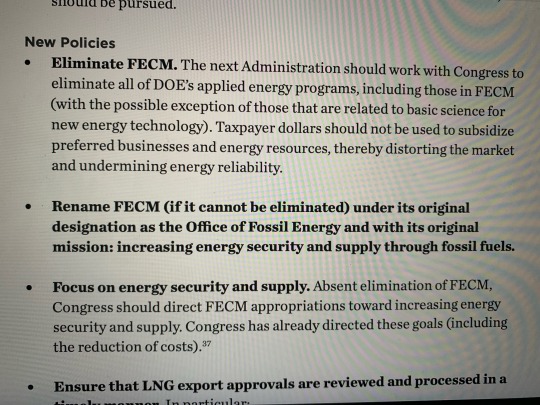
They want to LOG NATIONAL FORESTS TO "THIN" THE TREES TO STOP WILDFIRES.
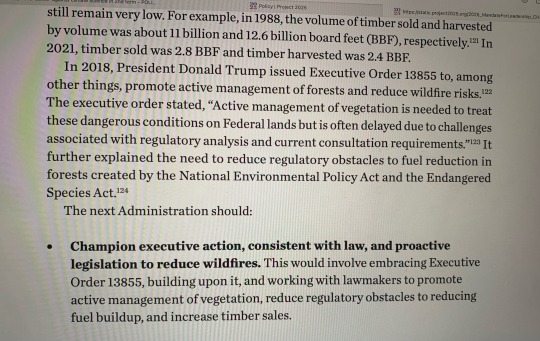
THEY WANT TO FORCE OREGON AND CALIFORNIA TO LOG THEIR NATIONAL FORESTS AND TREAT THEM AS FOR TIMBER PRODUCTION

There are specific provisions in Project 2025 to essentially destroy the Endangered Species Act, causing it to defer to the rights of "economic development" and "private property." The plan includes delisting gray wolves, cutting the budget so that a "triage" system is used to determine which species will get protection, removing funding for research, removing experts and specialists from the decision-making process, and preventing "experimental" populations of animals from being established.


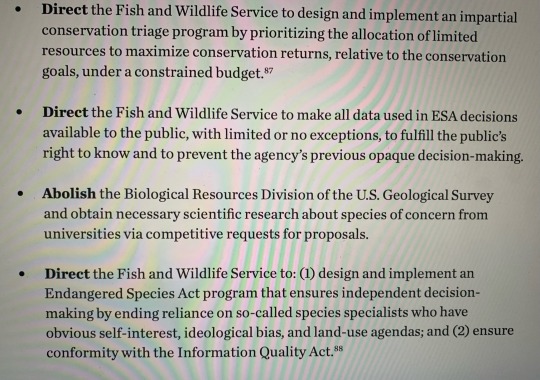
This is so much worse than I expected it to be and there's much more past that: They want to deregulate pesticides and remove much of the EPA's ability to regulate pollutants as well.
Also included in the manifesto is that we should
withdraw from nuclear weapons nonproliferation agreements, build more nuclear weapons, and resume nuclear weapons testing
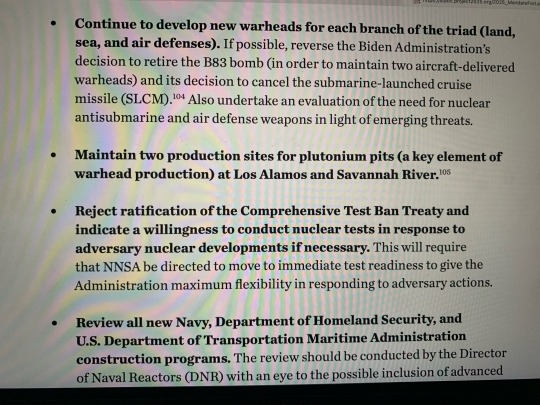
The manifesto comprehensively outlines the scorched-earth elimination of abortion access, down to ensuring doctors aren't even trained to perform abortions. There are plans in here to disrupt abortion access GLOBALLY, not just domestically.
Not only that,the Republicans plan on reframing family planning programs around "fertility awareness" and "holistic family planning."
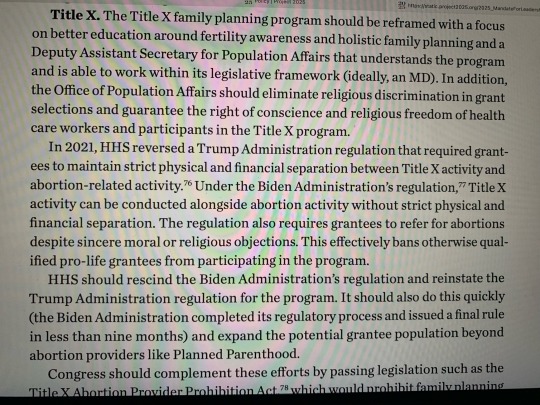
I can't even describe it all. I'm trying to give screenshots of the most important things but there's so much.
The foreign policy is a nightmare. They plan to push fossil fuels onto the Global South and promote the development of fossil fuel industry in the "developing world."
It is aggressive and antagonistic towards other nations, strongly pro-military, proposing that we INCREASE (!!!!!) defense spending, improve public opinion of the military and military recruitment, and increase the power to fund new weapons technology.
Just read the Department of Defense section. It's about greatly increasing and strengthening the military-industrial complex, collaborating more closely with weapons manufacturers, removing regulatory barriers to arming our allies and to inventing new military weapons, and recruiting more people into the military. They include provisions to develop AI technology for surveillance. And of course, continuing to support Israel is in there.
Elsewhere it proposes interfering in foreign countries with creepy pro-USA propaganda campaigns, even establishing international educational programs where faculty have to pledge to promote USA interests.
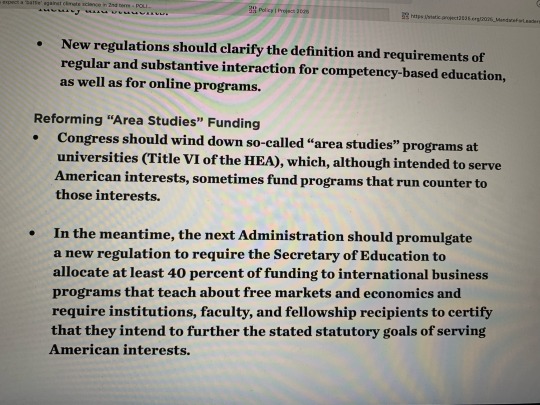

There's a line in here about getting rid of PBS because SESAME STREET is LEFTIST for God's sake.
HOW are people claiming democrats have the same policies. I feel like i'm losing my mind.
16K notes
·
View notes
Text
Regulatory Training with MEMA
Ensuring FCA compliance is crucial for financial services firms. Our training guarantees that employees are competent in their roles, adhering to FCA rules on:
Attaining Competence
Maintaining Competence
Record Keeping
These principles help firms make informed HR decisions and identify compliance issues.
Ongoing FCA Compliance Support
MEMA offers tailored support for FCA-authorized entities to maintain compliance, providing services like documentation, ongoing advice, impartial monitoring, and more.
Why Choose MEMA?
Since 2019, MEMA has helped hundreds of businesses gain and retain FCA authorization. Our team, composed of ex-regulators, consultants, and specialists, offers expert solutions for complex regulatory requirements. We provide comprehensive support to develop your business model and ensure compliance.
For more information, Click here.
0 notes
Text
Leveraging Microlearning Platforms for Effective Regulatory and Compliance Training

In an era where regulatory requirements and compliance standards are continually evolving, organizations face the challenge of keeping their workforce updated and informed. Traditional training methods often fall short in addressing the need for timely and engaging content. Microlearning platforms offer a modern solution by delivering compliance training in short, interactive modules. This article explores how microlearning platforms can enhance regulatory and compliance training, informed by MaxLearn's blog on the microlearning map for compliance training.
Challenges in Regulatory and Compliance Training
Regulatory and compliance training is vital for ensuring that employees understand and adhere to legal and industry standards. However, traditional training approaches encounter several issues:
1. Complexity and Volume: Regulatory content can be intricate and vast, making it challenging to cover comprehensively in lengthy training sessions.
2. Engagement: Long, text-heavy training programs can lead to disengagement, reducing their effectiveness.
3. Retention and Application: Ensuring that employees remember and apply compliance knowledge is a significant challenge with conventional methods.
Microlearning Platforms: A Solution for Compliance Training
Microlearning platforms address these challenges by delivering content in short, focused modules. Here’s how they improve regulatory and compliance training:
1. Focused Content: Microlearning breaks down complex compliance topics into small, manageable pieces, making it easier for employees to grasp and retain essential information.
2. Interactive Learning: Microlearning modules often include interactive elements such as quizzes, simulations, and scenarios, which enhance engagement and practical understanding.
3. On-Demand Access: Employees can access microlearning content anytime, allowing them to engage with training materials at their convenience. This flexibility supports varied learning schedules and reduces training disruptions.
4. Rapid Content Updates: The modular nature of microlearning facilitates quick updates, ensuring that training materials remain current and relevant in response to regulatory changes.
Best Practices for Integrating Microlearning in Compliance Training
To effectively utilize microlearning platforms for regulatory and compliance training, follow these best practices:
1. Create Modular Content: Develop microlearning modules that address specific compliance topics or scenarios. This approach allows for easy updates and ensures that content is relevant and targeted.
2. Incorporate Interactive Features: Use interactive elements like quizzes and simulations to make learning engaging and to help employees apply compliance knowledge in practical situations.
3. Leverage Analytics: Utilize the analytics capabilities of microlearning platforms to monitor learner progress and engagement. Analyze this data to identify areas where additional training may be needed and to refine content.
4. Update Content Regularly: Ensure that microlearning modules are updated promptly to reflect changes in regulations and industry standards. This agility helps maintain the relevance and accuracy of training materials.
The Benefits of Microlearning for Compliance Training
Implementing microlearning platforms in regulatory and compliance training can lead to several advantages:
1. Enhanced Understanding: Short, focused modules make complex compliance information easier to understand and retain, improving overall comprehension.
2. Increased Engagement: Interactive and flexible microlearning content keeps learners motivated and engaged, leading to more effective training outcomes.
3. Efficient Use of Resources: Microlearning enables the efficient delivery of training content, reducing the time and resources required compared to traditional methods.
4. Up-to-Date Knowledge: The ability to quickly update content ensures that employees are always informed of the latest regulatory changes, supporting continuous compliance.
Conclusion
Microlearning platforms offer a valuable approach to enhancing regulatory and compliance training. By delivering concise, interactive, and accessible content, these platforms address the limitations of traditional training methods and ensure that employees stay informed and compliant. For more insights into optimizing compliance training through microlearning, explore MaxLearn's blog on the microlearning map for compliance training.
#Regulatory and Compliance Training#microlearning#microlearning platform#compliance training#corporate training
0 notes
Text
Being a clinical research associate (CRA) can be a rewarding yet demanding role. From ensuring regulatory compliance to managing data accuracy, CRAs often encounter various hurdles in their day-to-day operations. Let’s delve into some common challenges faced by these diligent professionals.
0 notes
Text
Steps to stay updated on the drug regulatory changes

Get more info at https://www.companysconnects.com.
#pharmacovigilance courses#clinical data management training online#clinical research certified professional course#drug regulatory affairs
0 notes
Text
Apparently my new Wednesday tradition is crying hysterically about my job instead of like. going to derby practice or partaking in a hobby or something
#just. basically some food safety shit and regulatory shit are happening and shits fucked#like it’ll be fine probably but for now everyone is stressed out#boss still won’t treat me like a supervisor#plant manager maintains his very high expectations for me despite no training or guidance#the student workers look to me for information but sometimes I have the wrong info! it happens! don’t fucking yell at me for screw ups#just. ugh. this was supposed to be fun and fulfilling but it’s not. it’s just labor.#it’s just managerial duties for 13 dollars an hour. it’s fine.#work post
0 notes
Text
A Robust Microlearning Platform: Your One-Stop Solution for Compliance & Ethics Training

In today's fast-paced business world, where compliance and ethics are more critical than ever, organizations face the daunting task of ensuring that all employees, from top executives to the operational workforce, are not only informed about relevant policies and regulations but also proficient in applying them. Traditional training methods often fall short in this regard, struggling to keep up with the evolving demands of modern workplaces. This is where a robust microlearning platform steps in, offering a comprehensive technology solution that integrates key aspects of compliance and ethics training. By enabling the creation of risk- and role-specific content, delivering it effectively across all organizational levels, and verifying employee learning and proficiency, such platforms are transforming how businesses approach training.
The Need for a Robust Microlearning Platform
Compliance and ethics training is not just about ticking boxes or meeting regulatory requirements. It is about embedding a culture of integrity within the organization, ensuring that every employee understands and adheres to the rules, and can make ethical decisions in their daily work. This requires training that is not only informative but also engaging, accessible, and relevant to each individual's role.
Traditional training methods often involve lengthy sessions that attempt to cover vast amounts of information in a short time. Unfortunately, this approach can overwhelm learners, leading to low retention rates and poor application of the knowledge gained. Moreover, these methods often fail to address the specific needs of different roles within the organization, treating all employees as if they have the same training requirements.
A robust microlearning platform addresses these challenges by breaking down complex topics into bite-sized, easily digestible modules that are tailored to the specific needs of each role. This approach not only makes the training more manageable but also ensures that it is more relevant and applicable to the learner's daily work.
Creating Relevant and Risk- & Role-Specific Content
One of the primary advantages of a robust microlearning platform is its ability to create and deliver content that is both relevant and specific to the risks and roles within an organization. In the context of compliance and ethics training, this means developing modules that address the particular challenges and requirements faced by different departments and levels of the organization.
For instance, the compliance training needs of a top executive will differ significantly from those of an operational worker. Executives might need to focus on high-level ethical decision-making and risk management, while operational workers may need to be more concerned with day-to-day regulatory compliance and the ethical implications of their specific tasks. A robust microlearning platform allows for the creation of customized training paths that cater to these differing needs, ensuring that each employee receives the training that is most relevant to their role.
Moreover, by focusing on risk-specific content, the platform can help organizations address the most pressing compliance and ethics issues they face. This targeted approach not only makes the training more effective but also ensures that it is aligned with the organization's overall risk management strategy.
Delivering Content Across All Levels
In any organization, the workforce is diverse, encompassing individuals with varying levels of experience, expertise, and learning preferences. Delivering training that resonates with this wide array of learners is a significant challenge, one that traditional methods often struggle to meet. A robust microlearning platform excels in this area by offering a flexible and scalable solution that can deliver content to learners across all levels, from top bosses to the operational workforce.
The platform's ability to deliver training in short, focused bursts makes it ideal for reaching employees who may have limited time for training. For example, busy executives can benefit from concise modules that provide the essential information they need without taking up too much of their valuable time. Meanwhile, operational workers can access training that is directly relevant to their daily tasks, delivered in a format that is easy to understand and apply.
Furthermore, a robust microlearning platform can support multiple delivery methods, including mobile learning, which is particularly important in today's increasingly remote and distributed work environments. By making training accessible anytime, anywhere, the platform ensures that all employees, regardless of their location or schedule, have the opportunity to engage with the content.
Verifying Employee Learning and Proficiency Levels
Creating and delivering relevant training content is only part of the equation. To truly ensure compliance and ethics within an organization, it is essential to verify that employees have not only engaged with the training but have also achieved the necessary level of proficiency. This is where the assessment and tracking capabilities of a robust microlearning platform come into play.
The platform can include various assessment tools, such as quizzes, scenario-based assessments, and interactive exercises, to test learners' understanding and application of the material. These assessments can be tailored to the specific content of each module, ensuring that they accurately measure the learner's knowledge and skills in the relevant areas.
Moreover, a robust microlearning platform provides detailed analytics and reporting features that allow organizations to track learner progress and performance. This data is invaluable for identifying areas where additional training may be needed, as well as for demonstrating compliance to regulators and stakeholders.
In addition to assessing individual learners, the platform can also provide insights into overall training effectiveness. For example, organizations can use the data to analyze how well the training aligns with their compliance and ethics goals, and make adjustments as needed to improve outcomes.
Enhancing Engagement and Retention
A key challenge in compliance and ethics training is maintaining learner engagement. Traditional methods often suffer from low engagement levels, leading to poor retention of the material. A robust microlearning platform addresses this issue by incorporating various strategies to keep learners engaged and motivated.
One such strategy is the use of gamification, which can transform training into a more interactive and enjoyable experience. By incorporating elements such as points, badges, and leaderboards, the platform can encourage friendly competition and motivate learners to complete the training and perform well on assessments.
Another engagement-enhancing feature of a robust microlearning platform is the ability to deliver content in various formats, such as videos, infographics, and interactive scenarios. This variety not only caters to different learning preferences but also helps to reinforce key concepts and make the training more memorable.
Moreover, the platform can support spaced repetition, a proven technique for improving long-term retention. By revisiting key concepts at regular intervals, spaced repetition helps to move information from short-term to long-term memory, ensuring that learners retain the material over time.
Conclusion
In conclusion, a robust microlearning platform offers a one-stop technology solution for compliance and ethics training that integrates key aspects such as creating relevant and risk- & role-specific content, delivering content across all levels of the organization, and verifying employee learning and proficiency levels. By providing a flexible, scalable, and engaging approach to training, these platforms are helping organizations to meet the challenges of modern compliance and ethics training head-on. Whether you are looking to improve the effectiveness of your training programs, enhance learner engagement, or ensure that your employees are proficient in applying the knowledge gained, a robust microlearning platform is an essential tool for achieving your goals.
#compliance training#compliance training online#compliance training for employees#compliance courses#hr compliance training#corporate compliance training#compliance officer training#hr compliance courses#environmental compliance training#staff compliance training#safety and compliance training#safety compliance training#annual compliance training#ethics and compliance training#training for compliance#regulatory and compliance training#compliance safety training#yearly compliance training#Compliance Microlearning
0 notes